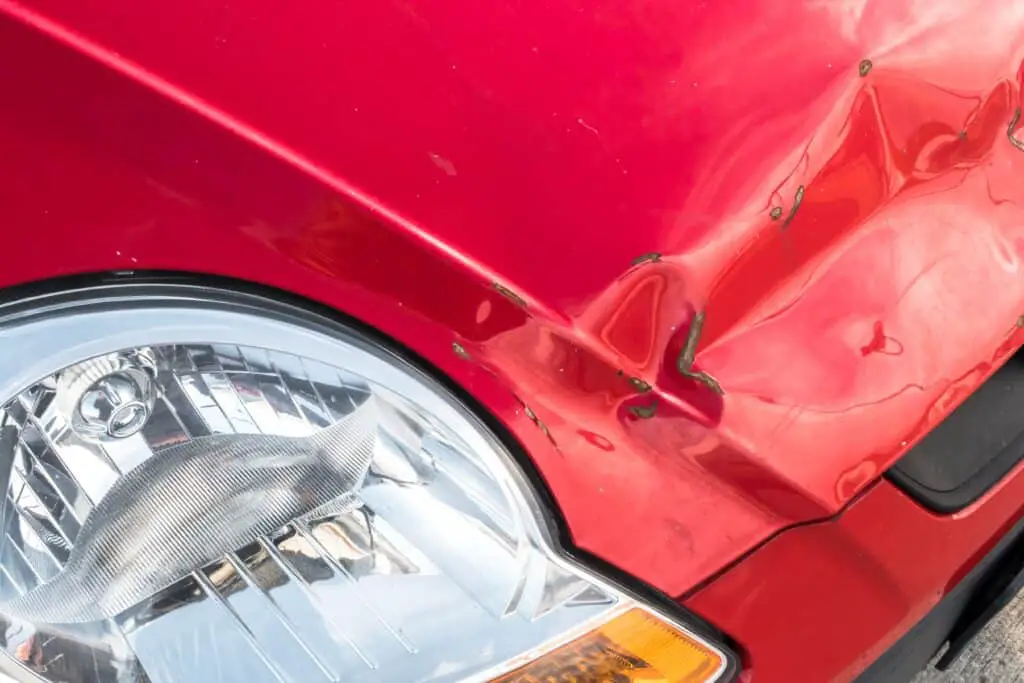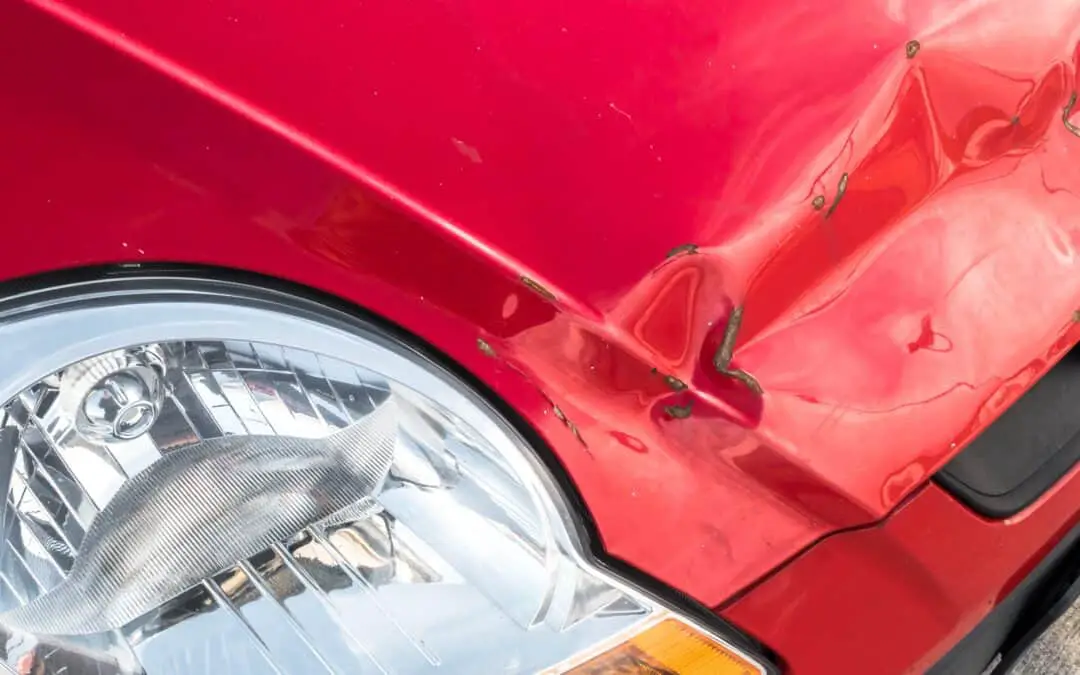This post contains affiliate links.

Car rental companies are a great way to explore a new city that is not close to your home town on your own time. Unfortunately, just like with your car, anything can happen to your rented vehicle as well. How much do car rental companies charge for dents?
Car rental companies can charge between $500 and $3000 for dents caused by the renter if there is sufficient evidence. Minor damages to rental cars, such as dents in the bodywork, and scratches chips, may be covered by the Damage Waiver if the renter has purchased it beforehand.
Car rental companies will charge according to the severeness of dents caused while rented. So, How much do car rental companies charge for dents?
Dents When You Purchase The Damage Waiver
For your peace of mind, car rental companies offer you a choice of two optional waivers for your protection in case of the event of minor accidental damage, such as dents, to your vehicle.
These waivers are known as Collision Damage Waiver (CDW). A Damage Waiver is a protection product offered by car rental companies that you can purchase with your car rental before renting.
A collision damage waiver is optional, with the cost of the waiver depending on a wide variety of factors. These factors can be on what type of rental car and where and how far the renter is driving the vehicle. The waiver will usually cover any losses from theft or damage to a rental car. However, the damage waiver is highly unlikely to cover any bodily injury caused by an accident.
A collision damage waiver can cost you anywhere between $200 and $500 in total, but you will only be liable to pay 20% of the damage costs if there are any. If you do not purchase the collision damage waiver, you will have to pay 100% of any damage costs.
A collision damage waiver only covers your rental car’s damage. A collision damage waiver will not cover any liability-related expenses. Liability-related expenses are things like if the renter causes an accident that damages other vehicles or if the damages result in injuries.
In addition to this, the collision damage waiver will also not cover any risky behaviors that result in damage to the rental car, such as driving under the influence, speeding and driving on unauthorized roads, or off-roading. Similarly, any loss or theft of the rental vehicle will also not be covered by the collision damage waiver.
You should also be cautious of less obvious damage, such as dents, damage to the windshield, mirrors, and tires. Though these damages are not as severe, this kind of damage is much more common amongst renters and quickly adds up.
When renting a vehicle from a car rental company, you will have the choice of two collision damage waivers, and it is up to you as the renter to decide which one to get.
Firstly, there is a limited waiver, which means that in the event of an accident, you as the renter will be held responsible for up to the specified amount, which will be indicated on the rates table for repair to or replacement of the vehicle or the damaged part of the vehicle. You also have a second option, known as the Super Collision Damage Waiver (SCDW).
This lower, non-waivable liability will allow you to pay less for damages caused as the renter. If you decline either of these two options, you will be held fully liable for the total amount of accrued damages. The car rental company will gain authorization to secure your credit card for the rental duration.
It would be good to note that in the event of an accident occurring while the rented vehicle was not driven by the agreed renter or other authorized driver as stated on the rental agreement, the renter will still be held fully responsible for the total damage of the rented vehicle. If the vehicle was driven on unsuitable roads, such as dirt roads or any other unauthorized roads, the renter was driving negligently.
Dents When You Do Not Purchase The Damage Waiver
if you decide not to purchase the Damage Waiver and the car gets damaged, you may have to pay out of your own pocket for the needed repairs. This includes more minor damages as well, such as dents.
Your personal car insurance may or may not cover the total cost required for repairs, so it would be best for both yourself and the car rental company to contact your insurance provider before you rent a vehicle or as soon as you notice a dent in your rental car.
Are you wondering how your out-of-pocket costs are determined when there is a damage claim? When you report the damage following a trip, and you and your host elect to have the car rental company handle the claim, they will do the following:
- The rental car company will investigate the damage that was caused during your trip, and that is eligible damage. In the case of eligible damage, you will be responsible for the damage and all related costs, regardless of whether the damage was your fault. If you were charged a security deposit before your trip, the rental car company would hold these funds, and it will be applied to any amount that is due.
- They will then get an estimate of the damage to determine the final repair or replacement costs.
- They may also add any related costs and fees.
- Once the final claim cost is determined, if a third party present identified to be at fault, and the rental car company can collect from them, they will do that first. If they cannot recover the costs from the third party or their insurance company, you will be charged fees. You can also contact your insurance company, and depending on your insurance. They will try to either wholly or partly recover the damage costs and the claims processing and appraisal fees.
- After your car rental company has recovered the costs from your personal insurer (if you have one), they will check to see if there is still an outstanding balance on the damage of the car. If there is, they will compare it to the out-of-pocket costs you are responsible for based on the severeness.
Why Do You Pay For Small Damages Such As Dents?
If you damage a rental car, especially more minor dents, the matters are entirely out of your hands as the renter. While the rental company decides the cost, you will have to pay for the repairs. Firstly, you will be charged a fee to repair the damage.
And, since the rental car has to be temporarily taken out of service while the damage must be determined, there will be administrative fees and possible loss-os-use fees for the time the vehicle is out of service.
This is the reason why small damage claims such as dents can very quickly become more costly when it is up to the rental car company to decide exactly how much to charge you. Most of the time, you will be relying on your car rental insurance for coverage. This is why it is so essential to get a Collision Damage Waiver.
It is crucial that you as the renter know the provisions of your coverage, regardless of whether your coverage comes from your personal car insurance company, a credit card issuer, the rental car company’s insurance, or a third-party user who was at fault.
In most damage claim cases, a renter will rely on coverage by a personal automobile insurance policy or a credit card. This means that the credit card issuer will pay up to the rental’s private insurance that is deductible, but only if and when a claim is filed against the personal car insurance policy.
If your damage claim on your rental car is very high, even when your credit car insurance ultimately covers it, you might still get charged with an increase in your personal car insurance premium.
Conclusion
Renting a car can be a fantastic experience, releasing you from any unwanted stress that could be caused by public transportation. However, it is always possible for extensive or minor damages to occur to any vehicle. By knowing the procedure for a rented car, you will be doing your best to avoid unnecessary costs when returning the car.
Renting a vehicle could also be exciting, so you may find yourself wanting to tush through the rental-agreement process so you can start driving and exploring! Remember, a collision damage waiver will only cover 80% of the total costs for dents. although this is a lot, make sure you drive with caution!


